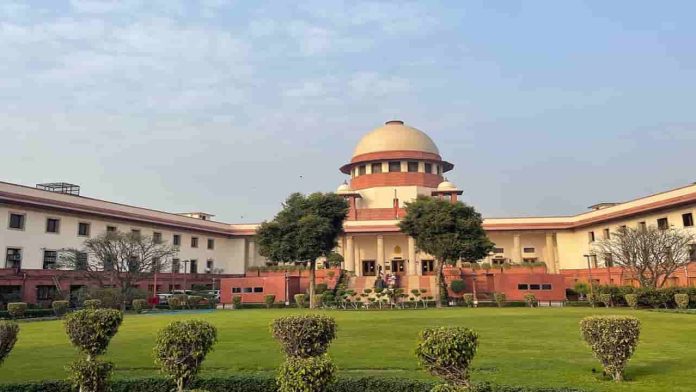The Supreme Court has received a review petition against its decision to quash the criminal proceedings pending against Sukhbir Singh Badal the Shiromani Akali Dal chief and his father and five-time chief minister Parkash Singh Badal along with the senior vice-president of the party Daljit Singh Cheema in an alleged forgery case over the political party’s dual constitutions.
In April, a verdict was delivered by a division bench of Justice MR Shah and Justice CT Ravikumar in the pleas filed them challenging summons issued in connection with a police case lodged against them on the strength of a complaint by a Hoshiarpur-based social activist and national vice-president of the Socialist Party, Balwant Singh Khera, alleging forgery, cheating, and concealment of facts.
The original complainant has sought a review of the April 28 judgment – which was delivered days after the demise of Parkash Singh Badal – claiming that it contained several ‘serious errors apparent on the face of the record’ resulting in a ‘grave miscarriage of justice’ in this matter. The petition states:“The errors are by way of mistakes of fact, as well as of law.
The errors include – erroneous recording and appreciation of the allegations in the complaint, application of the incorrect ingredients of various provisions of the law, and erroneous recording that no false document was produced, although several such documents are on record, apart from a witness statement categorically admitting to the deception and fraud alleged.”
Accusing the top court of conducting a mini-trial while quashing the summons – despite several judgments directing high courts to only find out if a prima facie case was made out based on the material collected, the petitioner has stated, “This court has sat like a trial court and despite a plethora of crucial evidence against the accused, has disregarded all of it on patently erroneous grounds – by way of errors of fact and of law.
“The role of the Supreme Court was to see whether a prima facie case was made out by examining the sufficiency of material for passing the ‘summoning order’ and the high court judgment but, [they] have been erroneously overlooked.”
Even the main allegation, the petition states, has been erroneously recorded in a limited manner. The review petitioner has argued that while the court considered the main allegation to be that of filing a false memorandum annexed with the application for registration under the Representation of the People Act, 1951, “the issues are far larger and include the filing of a false constitution and undertaking before the Election Commission of India and the using of two different constitutions before two different authorities – one, a false and forged one, to meet the eligibility conditions for the party’s registration as a political party, and the other, the real one, to meet the eligibility conditions to contest the Sikh Gurdwara elections”.
After highlighting a host of other alleged errors in the decision rendered by the top court, the petitioner insists that this was a ‘fit case’ for invoking the power of review by the Supreme Court enshrined in Article 137 of the Indian Constitution read with Order 47 of the Supreme Court Rules, 2013.
The petition states: “The errors in this judgment have caused a very important criminal trial against the accused – powerful politicians – to get nipped in the bud and aborted at its nascent stage, despite abundant and compelling material and evidence pointing at their role in the offences alleged to have been committed.
“The trial is important as it reveals a plethora of evidence showing their involvement in a series of fraud, cheating, and forgery in a most brazen manner, and they may not be allowed to get away with such fraud. This is thus a clear case for invoking the power of review by the Supreme Court…to set right such wrongs that may have arisen due to judicial fallibility. It has been repeatedly held that the delivery of justice prevails above all, and that justice, must not only be done, but also, be seen to be done.”


